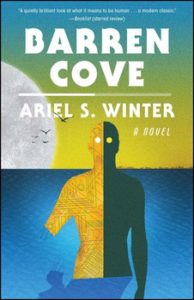 Barren Cove is about a family of robots living in a small, isolated seaside town. As in any family, there are differences in attitudes among the generations. The older robots were made by humans, but humans are all but extinct now. The younger robots are proud to be “entirely robotic,” not connected to filthy, weak, and mortal humans.
Barren Cove is about a family of robots living in a small, isolated seaside town. As in any family, there are differences in attitudes among the generations. The older robots were made by humans, but humans are all but extinct now. The younger robots are proud to be “entirely robotic,” not connected to filthy, weak, and mortal humans.
Beachstone, a solitary old human, owns a beach house in Barren Cove filled with robotic servants. He is old and sick but still knows how to rewire a robot if necessary. He falls in love with Mary, a young “female” android on the staff (though it is not clear what gender means for a robot). Her brother disapproves of the relationship (though it is unclear what “brother” means for a robot) and tries to sabotage them. Nevertheless, the happy couple has sex (undefined) and produces a child (which Beachstone manufactured from parts. The sexual act was apparently only symbolic).
The youngster is scorned by other robots because of his human heritage (although it is unclear what constitutes a “child” robot, since they don’t grow). Mary and her brother also “have” a child (e.g., the brother builds one), which is fine because incest would be undefined for robots.
Meanwhile, a really old, broken robot named Sapien (get it?) rents a room in the compound and narrates some of the goings-on in a first-person voice, but as he is absent from most of the proceedings he has nothing much to say. He gets reports from the in-house computer so all his information is second hand, which is funny, because he has a missing left arm.
Nothing really happens. There are feuds and jealousies, births and deaths, parades and rumors, the ordinary things you would expect of family and small-town life. The androids plug in oddball SIM cards to “get high” as if on drugs, though it is undefined how that could be a desirable or pleasurable experience for them.
And that’s the main problem with the book. The robots are filled with human motivation and human emotions, feelings, and thoughts, including boredom and a quest for existential meaning. They experience love, lust, jealousy, rages, biases, insights, compassion, hopes, use language and reason, and have a sense of family and kinship. They are psychologically indistinguishable from humans. So what’s the point of having them be robots?
Once in a while a robot will act as if it suddenly lacked empathy or understanding. It will kill a cat or even a child without compunction, “just for fun” because, hey, they’re only a robot! But for that trick to work, you have to ignore all the previous evidence of feelings, empathy, intuition, and so on. The novel does not establish any rules for switching between fully human mode and unempathic “robot mode” so the bit doesn’t work. It’s like a person having a sudden, temporary attack of psychopathy for no reason.
I liked Sapien, the old, damaged robot who had some historical perspective on life, but he has a very small part and hardly any lines and is a wasted opportunity.
So it’s a slow-paced story of the everyday lives of a family that just happens to be robots – not that there’s anything wrong with that! Is it psi-fi? Not really. It has human psychology and robots, but the latter is not used to illuminate the former. Rather, the two are indistinguishable. The aim of psi-fi is to learn something about the human mind from the way it interacts with technology. This doesn’t do that.
Winter, Ariel S. (2016). Barren Cove. New York: Emily Bestler Books, 211 pp.